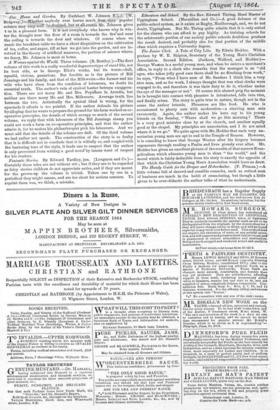its best side, as in George Eliot's works, but its
worst—dull, squalid, vicious, penurious. But forcible as is the picture of Bill Jennings and his family, and that of the Milkworts—the farmer and his wife who have risen from the condition of labourers, we doubt its essential truth. The author's vein of cynical banter betrays exaggera- tion. There are not many Mr. and Mrs. Poynders in Arcadia, but neither are there many Mr. and Mrs. Milkworts. Average truth lies between the two. Artistically the cynical ideal is wrong, for the spectacle it affords is too painful. If the author defends his picture by alleging that ho wants to prepare the ground for his farm worked on co-
operative principles, the details of which occupy so much of the second volume, we reply that with labourers of the Bill Jennings stamp you
could not work a farm on co-operative principles, and that the author admits it, for he makes his philanthropist pick his labourers. And we must add that the details of the scheme are dull. Of the third volume we had rather not speak. The construction of the story is so faulty that it is difficult not to conclude that it is wilfully so, and coupled with the bantering tone of the style, it leads one to suspect that the author is only prevented from writing a good noverby innate want of respect for his readers.






























 Previous page
Previous page